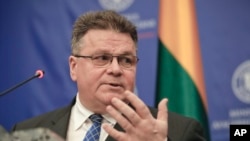Lithuania’s top diplomat said Russia’s live-fire military exercises adjacent to NATO territorial waters of the Baltic Sea are a direct military threat in the guise of routine naval drills.
Russia on Wednesday began the three days of missile tests to the alarm of Latvia, in particular, a NATO member who says the air-and-sea target practice with live munitions forced it to partly shut down civilian airspace and caused neighboring Sweden to reroute air and maritime traffic.
“They do it all the time,” Lithuanian Foreign Minister Linas Linkevičius told VOA's Russian Service on Wednesday, referring to Russia’s Baltic Sea naval drills that were held four years ago this month, in which smaller naval artillery was tested for all but two of 30 days.
“It was military hooliganism, not just a demonstration of military power,” he said, explaining that this week’s drills, while also legal, again put Scandinavia and the Baltics on edge.
“It was a demonstration of something else, and we already know what it means,” he added, echoing comments made on Tuesday by Latvian Prime Minister Maris Kucinskis, who called the latest exercises an explicit show of military force.
“It is hard to comprehend that it can happen so close to (our) country,” Kucinskis told Reuters, noting that Moscow’s decision to conduct tests so close to Latvian waters followed the West’s recent expulsion of Russian diplomats, the largest since the Cold War.
Show of support
Last week, the U.S. and more than two dozen countries, including the three Baltic states, collectively expelled more than 150 Russian diplomats in a show of solidarity over the poisoning of a former Russia spy in Britain. Russia, which denies any involvement or wrongdoing in the attack, retaliated by expelling more than 150 foreign diplomats, including 60 U.S. diplomats.
The latest Russian naval drills come a day after President Donald Trump hosted the presidents of Estonia, Latvia and Lithuania, and precede by one day a visit to Latvia by U.S. Army Gen. Curtis M. Scaparrotti, commander of U.S. military forces in Europe.
Russia’s naval exercises also preceded by two days a visit to the U.S. by NATO Secretary General Jens Stoltenberg, who is set to inspect a fighter jet production plant and American military command posts.
At a time of high East-West tensions, NATO officials worry that any accident involving military weapons and a civilian ship or plane could spark a wider conflict.
On Wednesday, Lithuanian President Dalia Grybauskaite said transatlantic security was high on the agenda of this week’s White House Baltic summit.
“The main goal was to talk about the NATO reform, about security in our region,” Grybauskaite told VOA's Ukrainian Service. “We got very good declaration of commitment to article 5 with all necessary elements to make our region more secure and more defendable — this was accomplished.”
Core NATO tenet
Despite the American president’s tendency to question Article 5 — a core NATO tenet that says an attack on one member is considered an attack on all members — other Baltic leaders said they left the White House feeling reassured.
“Quite clearly, there is an understanding that we all need to work together — those of us who share the same values of democracy — to make sure that we prevail,” Estonian President Kersti Kaljulaid told VOA Ukrainian. “We have been discussing the general security situation quite globally.”
Although no Baltic ministers said this week’s Russian naval drills break any international rules, the Latvian defense ministry summoned Russia’s military attaché to express its concern and to raise the issue of the timing.
Moscow, however, which accuses NATO of stirring up anti-Russian propaganda, said Monday that the exercises carried out by its Kaliningrad-based Baltic Fleet were nothing more than routine testing of forces after winter.
The drills follow last September’s massive war games, which stretched from the Baltics to the Black Sea, unnerving the West because of their scale, scope and what NATO called a lack of transparency.
Latvia plans to raise the issue of Russia's latest drills at a regular meeting of NATO envoys in Brussels next week, officials said.
After Tuesday’s White House Baltic summit, in which President Trump held a closed-door meeting in the Oval Office and a working lunch in the Cabinet Room, the American president boasted that “nobody’s tougher on Russia” than he has been, and that because of him, NATO member countries have started to “pay their bills.”
At the end of Tuesday’s White House meeting, however, Trump said his tough stance on Moscow hasn’t dissuaded him that it “would be a good thing” if the United States got along with Russia.
This story originated in VOA's Russian and Ukrainian services. Tatiana Vorozhko contributed original reporting. Translation of quotes from the original Russian by Elena Sokolova. Some information is from Reuters.






